On Juneteenth, a big ugly bill, & the danger of secret police

Good afternoon from upstate New York, where I’m been visiting my father to celebrate his birthday and Father’s Day. I hope you and yours are staying cool and safe on this summer solstice, the longest day of the year.
Thank you for reading, subscribing, and sharing. If you have questions, comments, tip, or suggestions, you can always reach me at alex@governing.digital.
On transparency
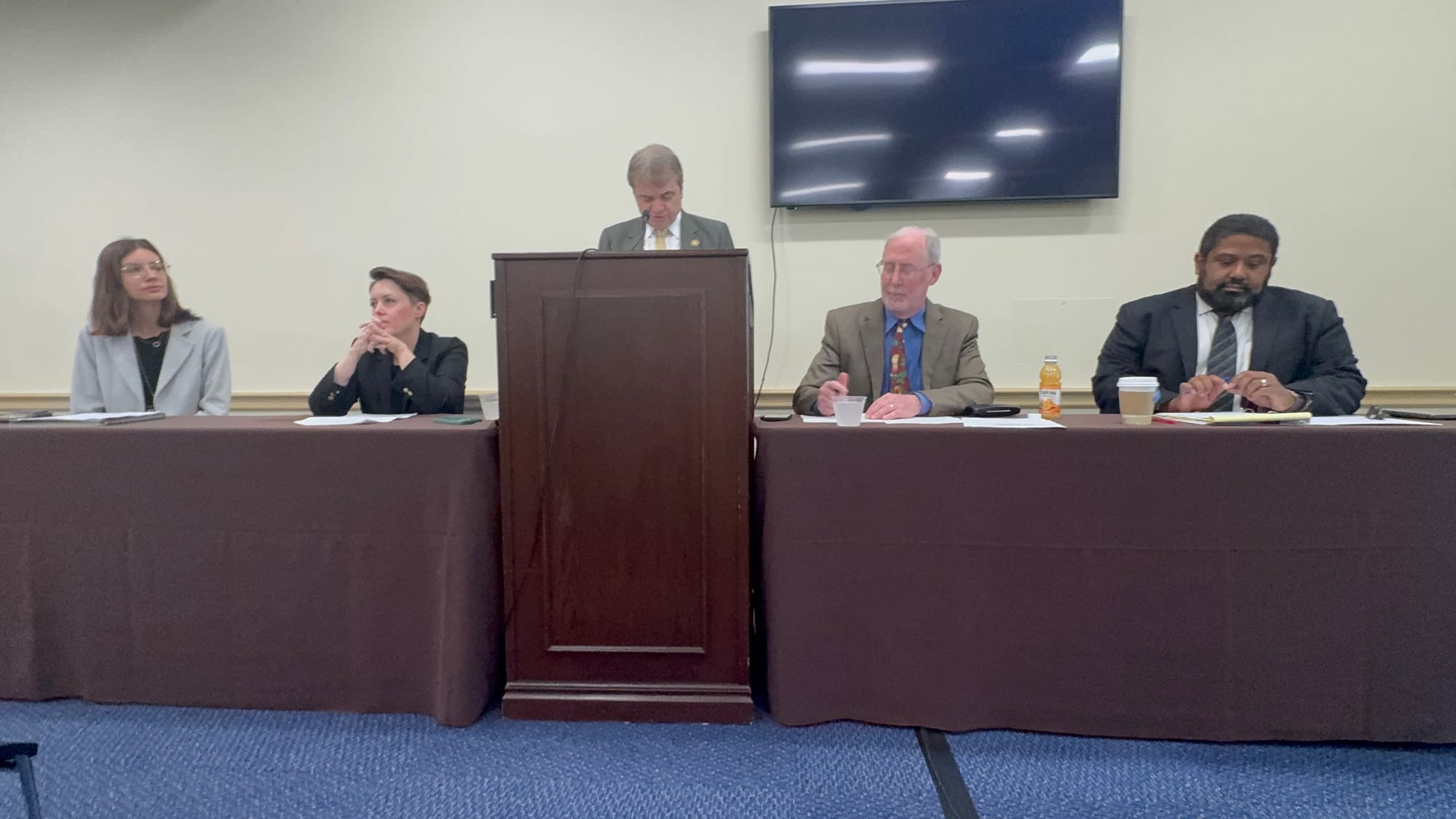
At a Congressional Transparency Caucus event in DC, good governance experts warned of increased secrecy & corruption in U.S. government. Video is available online, courtesy of yours truly:
If you watch until the latter half of the hour, you’ll hear my questions. If nothing else, make sure to watch Rep. Mike Quigley’s opening remarks.
He’s been a champion of open government for more than 15 years, across administrations.
As a Congressman from Chicago, he knows the cost of corruption and the importance of translarency better than most.
On Juneteenth, regression

Due process applies to all persons in the USA under our Constitution, no matter how many times anyone confidently proclaims otherwise online or at the White House.
But a new PRRI poll shows how many Americans support unconstitutional actions:
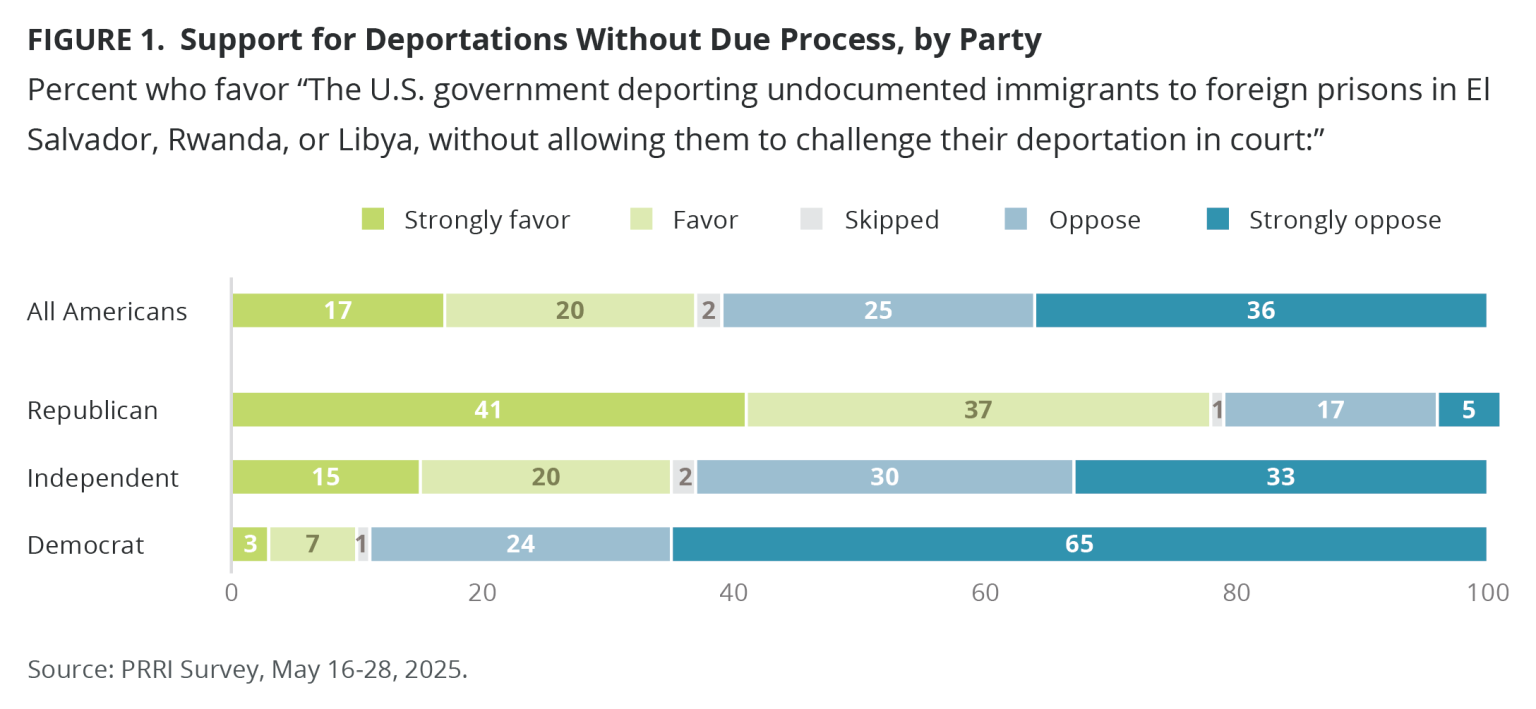
These basic constitutional rights harken back to the Magna Carta almost a millennium ago, under which:
“NO Freeman shall be taken or imprisoned, or be disseised of his Freehold, or Liberties, or free Customs, or be outlawed, or exiled, or any other wise destroyed; nor will We not pass upon him, nor [condemn him,] but by lawful judgment of his Peers, or by the Law of the Land. We will sell to no man, we will not deny or defer to any man either Justice or Right.”
The concept of evidence for a crime is even older, going back to the Code of Hammurabi in 1750 BC.
But in the United States, this fundamental tenet in the rule of law is under threat by masked, secret police who have abducted, detained, and wrongfully deported men and women without due process because they do not have legal immigration status.
Yesterday, when our nation celebrated the 160th anniversary of when the last slaves were freed in Texas, we should have been able to stand united by a common creed: all humans are created equal, with rights to life, liberty, & the pursuit of happiness under the 14th Amendment: “no State shall deprive any person of life, liberty, or property, without due process of law; nor deny to any person within its jurisdiction the equal protection of the laws.”
We have self-evidently not upheld those rights for all in 2025, nor the two centuries before. And yet, the arc of American’s history is still being bent towards justice by its people, despite the regressions of this year.
For this American, "Liberation Day" will continue to refer to "Victory in Europe Day," Emancipation Day, or Juneteenth.
I retain hope that we again find common cause in preserving and defending our union on Juneteenth and Independence Day in a future year, united as one nation, indivisible, with liberty and justice for all.
If you’re in the United States, I hope you were able to observe Juneteenth in whatever ways were meaningful to you and your community.
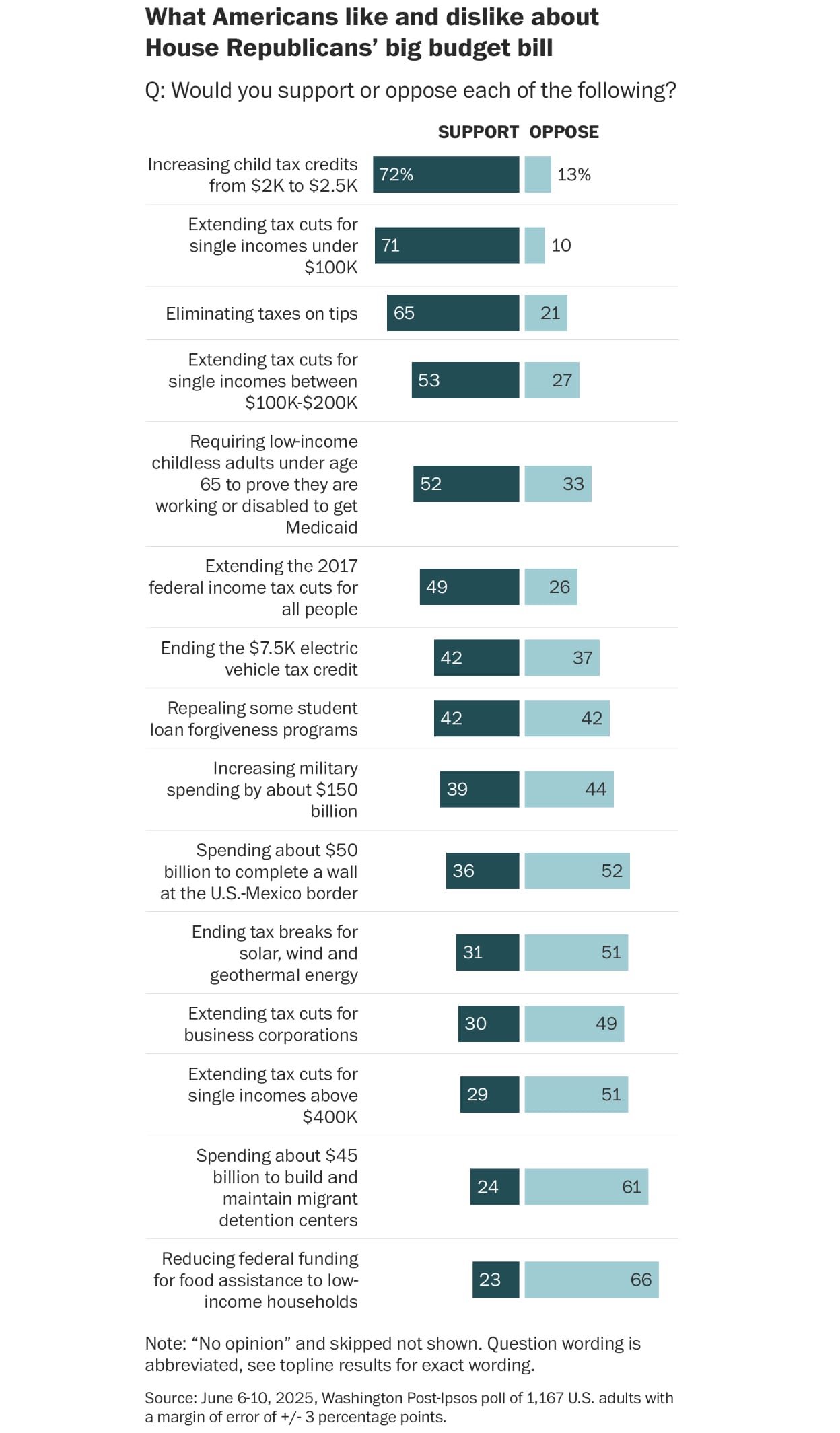
A big ugly bill runs into ugly politics
.The more Americans learn about the regressive legislation before the Senate, the less we like it — particularly extending tax cuts for corporations & millionaires, ending tax breaks for clean energy, cutting food aid for the poor, while spending tens of billions on a southern border wall or “migrant detention centers” that would concentrate immigrants in camps.
As Punchbowl News reports, “a plurality of Americans oppose the GOP reconciliation bill, just 67% of Republicans support the package and 71% of independents have an unfavorable view of the effort.”
Extending tax cuts for the wealthiest Americans and corporations while reducing Medicaid benefits & food benefits for the poor is toxic politically & socially.

A more responsible Congress that wasn’t captured by post/industrial interests and deferential to a corrupt party leader would allow tax cuts for corporations & billionaires to expire and extend tax relief for Americans who earn less than $400,000 annually, not blow up the budget deficit and national debt further.
Lawmakers would maintain energy investments across America to increase efficiency, charging networks & solar generation, & ensure no child goes hungry with SNAP funding, or without healthcare through Medicaid.
One day, a Congress will move individual bills that enjoy public support, instead of massive omnibus bills that contain many provisions favorable to corporations and billionaires that do not. But probably not this Congress.
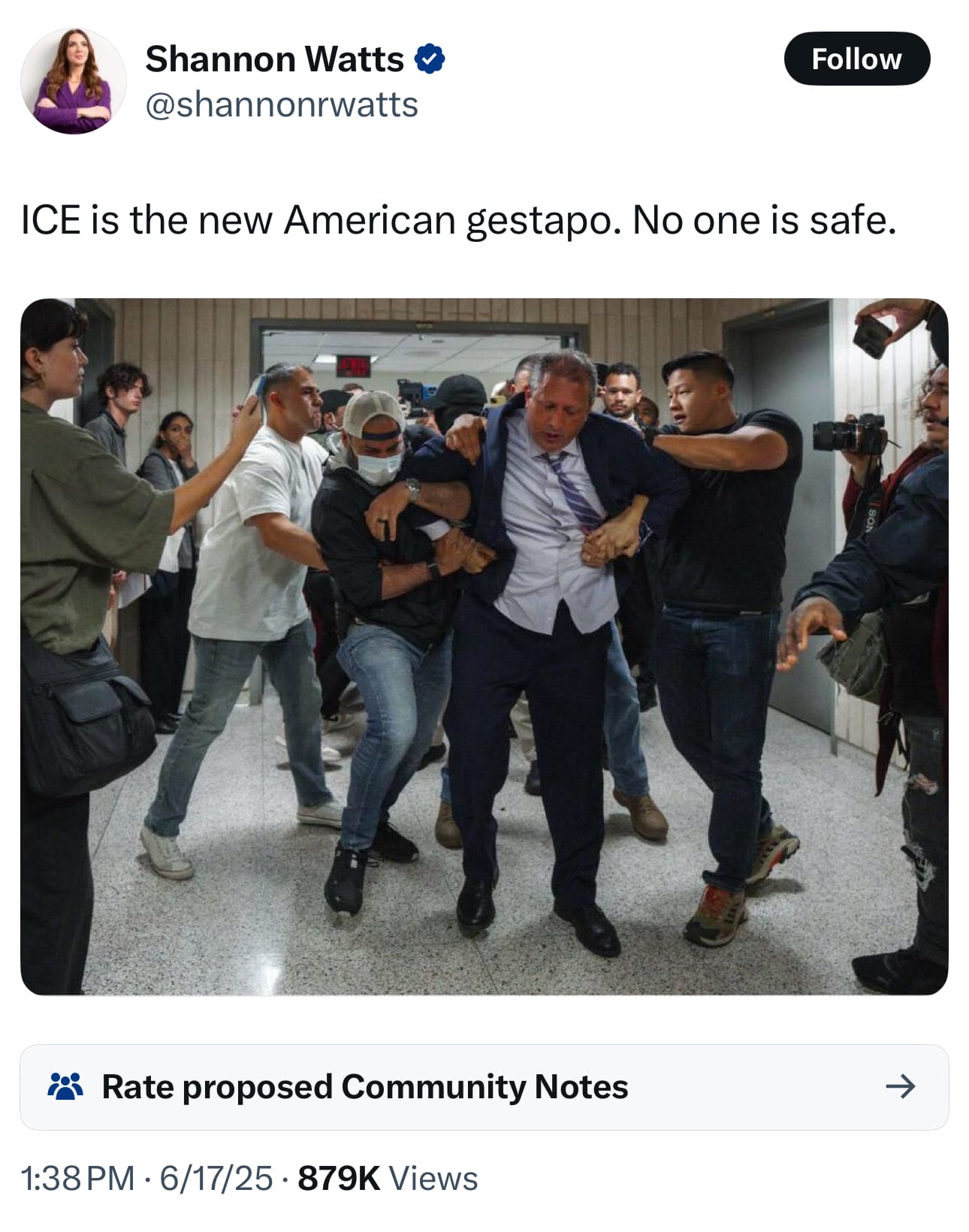
On secret police and the growing authoritarian state
Secret police have been used by authoritarian regimes around the world for decades to intimitate publics, repress dissent, and far worse.
Now, masked, anonymous Immigrations and Customs Enforcement (ICE) officers and agents being deployed in a mass deporration efforts arround the country, snatching and grabbing undocumented immigrants.
In doing so, they are drawing comparisons to the most notorious secret police in history: the Gestapo.
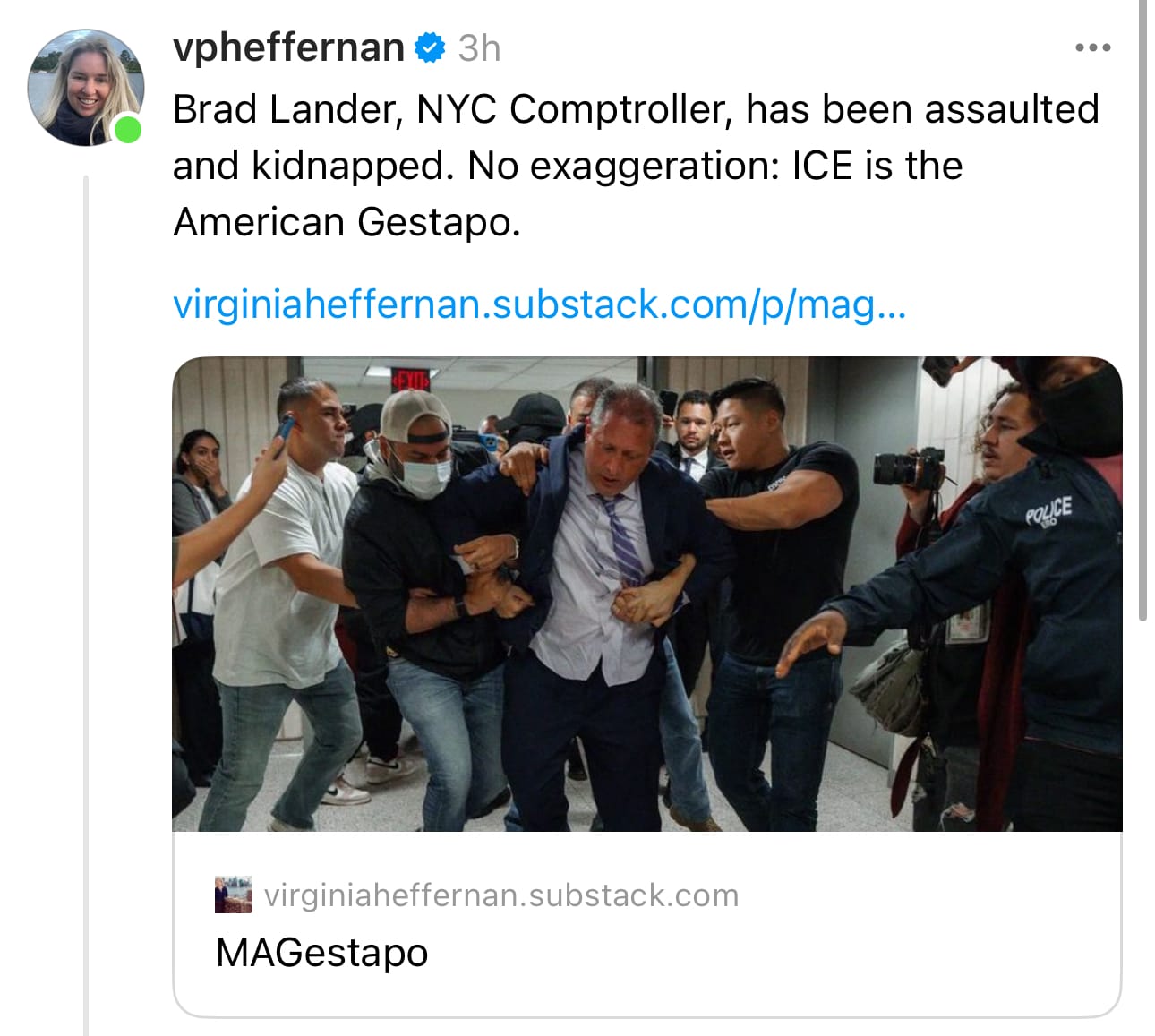
I think it’s inaccurate to describe any American law enforcement agency the Gestapo.
I worry that doing so will close hearts and minds to legitimate criticism of how ICE is operating, further hardening partisan decides instead of bringing us together.
But it’s also important to know history, so that we do not repeat it. Virginia Heffernan pointed me to an essay by Griffith Univesity Professor Lee Morgenbesser, an expert on authoritarian regimes, who makes a persuasive case that ICE is becoming secret police in the United States:
I’ve studied historical and contemporary secret police forces extensively across Africa, Asia and Europe. They typically meet five criteria:
they’re a police force targeting political opponents and dissidents
they’re not controlled by other security agencies and answer directly to the dictator
the identity of their members and their operations are secret
they specialise in political intelligence and surveillance operations
they carry out arbitrary searches, arrests, interrogations, indefinite detentions, disappearances and torture.
As she notes, ICE has engaged in unlawful policing, including arbitrary searches, arrests, interrogations, and indefinite detentions, which is one reason we are seeing Members of Congress going to inspect detention facilities:
Some of the most egregious reported examples include:
entering primary schools under false pretences in search of undocumented students
carrying out “collateral arrests”, that is detaining people not previously identified as targets during operations
detaining tourists and visa holders for weeksfor unknown reasons
and disappearing US citizens without any meaningful process.
As Griffith also notes, the bill before Congress would provide ICE with up to US$175 billion in funding over the next decade, which would “supercharge its use of surveillance, imprisonment and physical violence. When combined with a potential shift towards targeting US citizens for dissent and disobedience, ICE is fast becoming a key piece in the repressive apparatus of American authoritarianism.”
This, to me, is a key point: if the federal government is able to combine the Department of Homeland Security with deputized state and local police forces, it will have built the apparatus for a modern police state that could be weaponized against all American, not just immigrants.
To the extent the comparison to the Gestapo is useful now, it should stimulate Americans to learn about what life under the Nazi regime — or societies under the surveillance of the Stasi in East Germany, the KGB in the USSR or occupied nations like Estonia or Ukraine, under the Chinese police in the CCP regime today, or in Syria under Assad or Iraq under Hussein, or secret police in Argentina, Chile, Cuba, and so on.
The key lesson is that totalitarian dictatorships depend on secret policing to rule, whether Communist or fascist, and that they never limit their reach to violent criminals.
Six months ago, I would have argued that ICE is still not operating without constitutional constraints in the United States, imprisoning members of the political opposition, and sending religious minorities, GLBTQ people, or political dissidents to private prisons and concentration camps.
Today, the historic rhymes feel too resonant — or dissonant — not to hear or see parallels to secret police after a spring unlike any other in living memory.
We’ve now seen Democratic politicians forcibly removed and handcuffed at press conferences, arrested at a courthouse, or charged with assault when they attempted to inspect a federal detention facility.
As Heffernan pointed out, “ICE—and unbadged people in plain clothes—have now detained or arrested 4 elected government officials, all of them Democrats, and one circuit judge. None of them committed immigration offenses.”
I’ve been receiving torrents of angry abuse & threats from Americans on Facebook because I’ve written about these episodes and publicly decried illiberal abuses of power on other Facebook, including the forcible removal and restraint of a U.S. Senator from a press conference in a federal building he was being briefed in, as part of his constitutional oversight authority.
They’re profoundly ugly, not just cheering on the arrests, but celebrating violence and calling for more against their political opponents.

It’s clear that many Americans have been successfully primed to not only accept or endorse state violence not only against violent criminals, but their political opponents and fellow Americans.
I fear our nation is at the precipice of something larger and far uglier than deportation and gross violations of human rights and civil liberties in private prisons or internment camps.
Remember: it’s happened here before.

Speaking at the press conference Padilla interrupted, DHS Secretary Kristi Noem made a statement unparalled in my living memory, declaring that “we are staying here to liberate the city from the socialists and the burdensome leadership that this governor and that this mayor have placed on this country and what they have tried to insert into the city.”
Wherever federal authorities start talking about “liberating” a city from local elected officials, it’s flashing danger sign for democracy.
What to do? Call your Members of Congress to urge more oversight, transparency, and accountability. DHS may have declared that the constitutional authority of Congress to inspect a federal facility without notice is invalid is invalid, but the executive branch don’t make the law.
I still believe that first principles for public policing are a bulwark against authoritarianism, if cities and states can use law and order to hold the line.
In the United States, police officers should be transparent and accountable to the communities they serve and protect.
Like secret laws or secret meetings, secret police are anathema in any constitutional republic or representative democracy where the rule of law remains sacred, not the rule of strongmen.
Police officers carrying out the law in public should be clearly identifable in name and nature by default, not masked and anonymous.
Secrecy which denies accountability for any acts of state violence or violations of human rights or civil liberties they commit in the public eye.
States don’t have to wait: California Senate Bill 627, the “No Secret Police Act, would “prohibit police officers operating in California from concealing their identities by covering their faces.”
If enacted, ABC10 reports the law “would require officers to keep their faces visible and wear identifying information unless involved in high-risk situations like SWAT calls or natural disasters.”
This seems to balance the equities of law enforcement with accountability, but I expect it will end up in court as DHS asserts a right to have secret police to protect them against retaliation, equating officers showing their faces with doxxing.
It’s patently obvious that authorities should at minimum be clearly identifying themselves with badges and uniforms before grabbing people, not waiting at courthouses in masks to detain the immigrants seeking to follow the law and inviting copycat vigilantes and militias to mimic them, but that’s not how ICE is currently approaching their work.
Congress and states should not tolerate it.
As I was writing this, the New York City Bar issued a statement on ICE and transparency, that expands upon these principles and grounds them in federal law, which I share in full below.
The New York City Bar Association (the “City Bar”) views with alarm the U.S. Immigration and Customs Enforcement (“ICE”) officers’ new practice: wearing masks and otherwise obscuring their identities when conducting detentions and arrests. This abrupt change comes at a time when these government agents’ actions are the subject of widespread scrutiny, numerous legal challenges, and a public outcry from individuals and organizations – including the City Bar[1] – vehemently opposing unlawful detentions and emphasizing the need for due process of law for detainees.
In this light, the decision to begin concealing the faces of law enforcement agents who are carrying out arrests and detentions appears to be an effort to evade accountability, and to decrease transparency in response to increasing allegations of government overreach, abuse of power, and violations of constitutional rights. The use of masks is one among a panoply of legal issues presented by the administration’s recent actions against immigrants and visitors (and some citizens) but a significant one that can – and should – be immediately addressed and remedied.
The Code of Federal Regulations’ provision governing the conduct of immigration officers requires that “[a]t the time of the arrest, the designated immigration officer shall, as soon as it is practical and safe to do so[,] [i]dentify himself or herself as an immigration officer who is authorized to make the arrest.”[2] Just as police officers are routinely required to identify themselves as law enforcement and to display identifying information (such as their name and badge number), federal law enforcement officers likewise have a responsibility to safeguard the rights and safety of anyone under their authority by ensuring a means of accountability and allowing recourse to the courts to challenge any unlawful conduct.[3]The new mask policy endangers those detained by compromising the legal mechanisms needed to ensure that their constitutional rights are protected and that they can seek recourse for any violations of law associated with their arrest or detention. It also opens the door to abuse of power within the ranks of law enforcement: the inability to personally identify law enforcement officers removes a deterrent for physical abuse of detainees or violation of their rights by arresting officers. The recent agreements between the Department of Homeland Security and other law enforcement agencies to conduct arrests on suspicion of immigration law violations broaden the range of agency personnel who could be operating in masks and plain clothes while making summary arrests on the street.[4] In addition, these dangers extend to all those who, in recent days, have been protesting immigration actions and decrying unlawful detentions. They may be subject to the same risk of violations of their rights in encounters with masked federal law enforcement agents without the safety of accountability.
Safeguarding the legal rights of all persons confronted by federal law enforcement officers is all the more important where this administration’s actions have already resulted in the unlawful detention of visa-holders, legal permanent residents, and United States citizens, the denial of due process to wrongfully detained individuals, and defiance of court orders demanding their return, alongside an escalating practice of detaining individuals as a reprisal for the exercise of their First Amendment rights. Just as no democratic government should seek to avoid answering to its people, no law enforcement officer should seek to avoid the scrutiny required to ensure their actions comport with the law. In the absence of the ability to identify individual masked agents, those who supervise, authorize, and oversee their actions should also share liability for the deprivation of rights under the Constitution.[5]
Allowing masked ICE agents to conduct detentions also makes it increasingly likely that third-party actors will impersonate federal agents and use their anonymity to subject vulnerable populations to harassment and violence under the apparent color of law.[6] In recent months, ICE agents have regularly refused to present warrants when requested. Coupled with the new practice of face coverings during detentions, it becomes nearly impossible to distinguish the conduct of an imposter from that of an authorized agent. Even before this apparent mask policy went into effect, a rise in crimes perpetrated by individuals impersonating ICE agents and other law enforcement officers – including harassment, theft, extortion, assault, battery, sexual assault, and kidnapping – was being reported.[7] Tragically, at this writing, the suspect in the recent shootings of Minnesota state legislators and their spouses — two fatally — allegedly disguised himself as a police officer when approaching them at their respective residences at the time of the attacks.[8]
Neither the federal government nor the Department of Homeland Security has issued an official policy governing the use of masks by ICE agents or provided a clear justification for concealing officers’ identities despite the weighty concerns balanced against it.[9]Protecting an officer’s identity may be warranted in some circumstances, and the government clearly has a responsibility to take the safety of its officers into account when crafting policy, including concerns such as violence, harassment, or doxxing. The vast majority of these officers in face coverings, however, are not under serious threat or dealing with organized gangs or terrorist organizations; instead, they are arresting people in schools, workplaces, churches, shopping centers, or courthouses where they appear for lawful immigration proceedings and present no reasonable threat to detaining ICE agents. The widespread practice of hiding the identity of all officers conducting detentions is more likely to be exactly what it seems: an attempt to evade accountability for abuses by those purporting to enforce the law, and not justified by any need for the safety of the agents.
ICE agents’ use of masks not only screens potential abuses of power and shields officers from accountability, it is part of a pattern of government actions enabling the rise of repressive and authoritarian tactics. The images of people being grabbed off the street by masked, armed men, shoved into unmarked vehicles, and taken away to unknown locations bears a fearsome resemblance to the oppressive tactics of authoritarian regimes, methods of repression meant to eliminate opposition and instill terror.[10] We must not tread this path.
The right to challenge the government’s and its agents’ potentially unlawful acts is fundamental to our democratic system of government. This mask policy invites further rule of law erosion and compromises the courts’ ability to act as a check on the federal government by evaluating possible constitutional and statutory rights violations associated with ICE’s nationwide detention campaign. It poses a severe risk to a detained person’s rights and safety, and to the public at large. Weighed against these concerns, the administration cannot justify concealing its officers’ identity while they are rightfully subject to legal and public scrutiny. The New York City Bar Association urges ICE to terminate this practice immediately and ensure the transparency and accountability for its agents’ actions that our laws and our democracy require.



